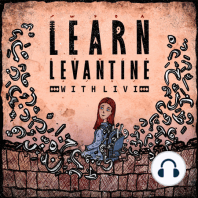2 min listen

Episode Eight: Expressions and sayings in the Levantine Dialect
Episode Eight: Expressions and sayings in the Levantine Dialect
ratings:
Length:
20 minutes
Released:
Nov 2, 2020
Format:
Podcast episode
Description
Hello everyone and welcome to Episode Eight!
Apologies for my absence, but now i'm back AND I have some news which is that i've set up an email address through which you can pass on your comments and feedback about the podcast as well as make suggestions for topics you would benefit from hearing about.
Please feel free to get in touch at learnlevantine@gmail.com
In other good news, i'm happy to tell you that Ramzi has some spaces available for conversational Arabic classes for intermediate students. His classes are ideally suited to those who can understand around 70% of the conversations in the podcast. For more information please get in touch at the same email address learnlevantine@gmail.com
I can highly recommend him as a teacher.
Here are some of the new words we will be hearing in today's episode:
عبارات - Sayings
أمثال - Examples
تعبير - Expression
وفرة - Abundance
بتستحضر - You evoke
وقح - Rude
اللغة المحكية - The spoken language
مبالغين - Exaggerators / People who exaggerate
مشابهة - Similar
فاصلة - Comma
بذكرو - They mention
الديك - The cockerel
معطيات - Data
برمي - I throw
تجنب - Avoiding / Avoid
بذيء - Indecent
سلفاً - In advance
Apologies for my absence, but now i'm back AND I have some news which is that i've set up an email address through which you can pass on your comments and feedback about the podcast as well as make suggestions for topics you would benefit from hearing about.
Please feel free to get in touch at learnlevantine@gmail.com
In other good news, i'm happy to tell you that Ramzi has some spaces available for conversational Arabic classes for intermediate students. His classes are ideally suited to those who can understand around 70% of the conversations in the podcast. For more information please get in touch at the same email address learnlevantine@gmail.com
I can highly recommend him as a teacher.
Here are some of the new words we will be hearing in today's episode:
عبارات - Sayings
أمثال - Examples
تعبير - Expression
وفرة - Abundance
بتستحضر - You evoke
وقح - Rude
اللغة المحكية - The spoken language
مبالغين - Exaggerators / People who exaggerate
مشابهة - Similar
فاصلة - Comma
بذكرو - They mention
الديك - The cockerel
معطيات - Data
برمي - I throw
تجنب - Avoiding / Avoid
بذيء - Indecent
سلفاً - In advance
Released:
Nov 2, 2020
Format:
Podcast episode
Titles in the series (15)
Learn Levantine with Livi: Introduction by Learn Levantine Arabic with Livi